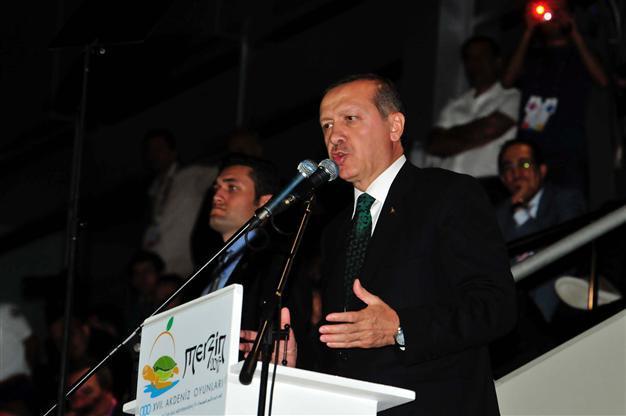No one can tell us who to fire: Turkish PM Erdoğan
ANKARA

'Those who gathered in the streets at our rallies did not loot, did not destroy,' Prime Minister Recep Tayyip Erdoğan said in reference to the government's 'Respect for the National Will' rallies. Hürriyet photo
Prime Minister Recep Tayyip Erdoğan has issued a stern warning to activists
participating in the ongoing protests, telling them to avoid “meddling” with
who the government should and should not remove from office.
Speaking at his ruling Justice and Development Party’s (AKP) parliamentary group meeting, Erdoğan said that “everyone should know their place,” regarding appeals urging his government to remove Istanbul Governor Hüseyin Avni Mutlu from office.
“There were some who came out of a meeting with our deputy prime minister and swung around ultimatums such as ‘you will remove that governor from office' and 'you will remove them from office.’ Which government you are speaking to? Can this be said to the AKP government?” Erdoğan said.
He also stood firm behind his previous claim that the police wrote a “heroic saga” during the protests. “They show carnations but hide the violence they inflict on the police. They are lynching in Ankara. You have seen how they attacked the police with granite stones,” he said.
“It is true, my police made a mistake too. My ministry is already conducting an inquiry. But when you look from a wider perspective, it is our police that face the violence,” Erdoğan said.
The prime minister once again singled out the Divan Hotel for harsh criticism. The hotel near Taksim Square opened its doors to protestors during police clashes, serving as a shelter and infirmary for the wounded. “The police did not attack [Divan Hotel] out of nowhere. Those who clashed with the police in the squares ran there, took shelter there. The owners offered very good hospitality. Following this, police entered it. You know, in law, harboring is a crime too. This was a harboring crime at the same time,” Erdoğan said.
Furthermore, Erdoğan again called on the Alevi citizens "not to be provoked," in an apparent response to accusations that he was triggering sectarianism through several governmental actions and his own language. He claimed that it was his government that sincerely dealt with Alevis’ problems, as opposed to the main opposition Republican People’s Party (CHP).
“In the last years, we also know very well that the CHP is taking part in dirty plans to provoke them, instead of making efforts to solve our Alevi citizens’ problems. I am especially requesting from our Alevi brothers across Turkey to see this dirty, dangerous game of the CHP. Starting from the marking of doors to the Reyhanlı attack, from the contact with Syria to the Gezi events, the CHP has been and is giving support very overtly to a very dangerous scenario. Right now, the owners of the TV channels and newspapers that provoke the Gezi events, those who want to pour Alevis onto the streets, are all members of the CHP,” Erdoğan said.
Meanwhile, Deputy Prime Minister Bekir Bozdağ announced that the government had been prepared to take new initiatives for resolving the problems of Alevis via consultations with representatives of Alevi society.
In a further criticism of the CHP, Erdoğan’s response to being called a “fascist dictator” by CHP leader Kemal Kılıçdaroğlu and Tunceli deputy Hüseyin Aygün was also remarkable.
“If they want to see a fascist dictator, they should look in the mirror, look back at their past. If they want to see a fascist dictator, they should look at Syria’s [Bashar] al-Assad who they are under the heel of. If they want to see a fascist dictator, they should look at the photo of the ‘national chief’ in their party headquarters, the photo of the ‘national chief’ who was the architect of the Dersim massacre,” Erdoğan said, referring to İsmet İnönü as “national chief,” a well-known nickname.
PM Erdoğan slams all media actors, echoes Gökçek over BBC reporter
ANKARA
In his party’s parliamentary group meeting, Prime Minister Recep Tayyip Erdoğan also slammed the international and local media, as well as social media, for alleged involvement in the Gezi protests. While arguing that news reporting was serving a conspiracy against a growing Turkey, he focused his wrath on Selin Girit, a BBC reporter in Turkey, by quoting a tweet she sent.
Despite already heated international criticism around a Twitter campaign initiated by Ankara Mayor Melih Gökçek, Erdoğan followed in his mayor’s footsteps by criticizing Girit for her coverage of anti-government protests.
“Turkey representative of an international broadcast institution is saying ‘Let’s not be the standing man, but the man who stops. Let’s stop the economy, do not consume. Do not consume for 6 months, they will listen to us.’ Can a person be involved in a conspiracy against their own country? Can this be called journalism?” Erdoğan said.
The original tweet of Girit simply quoted a proposal from one of the ongoing park forums in Istanbuş: “A proposal from the forum at Yoğurtçu Park: Let’s not be the standing man, but the man that stops. Let’s stop the economy. Don’t consume for six month[s]. They will listen.” Ankara Mayor Gökçek subsequently kicked off a campaign declaring her an “English agent” and accusing her of engaging in “treachery to her nation.”
Arguing that protesters knew that they would not be able to gain local support, Erdoğan argued that they had directly addressed the international media from the beginning. He added that the events were reported in an "exaggerated" manner abroad.
“Right from the start, some from inside and outside spread in a very systematic way that these demonstrations are completely innocent, righteous, and that the police was using violence. Planned operations were carried out in social media. Some media institutions in Turkey participated as head provocateurs. The international media also took part in these operations,” Erdoğan said.
